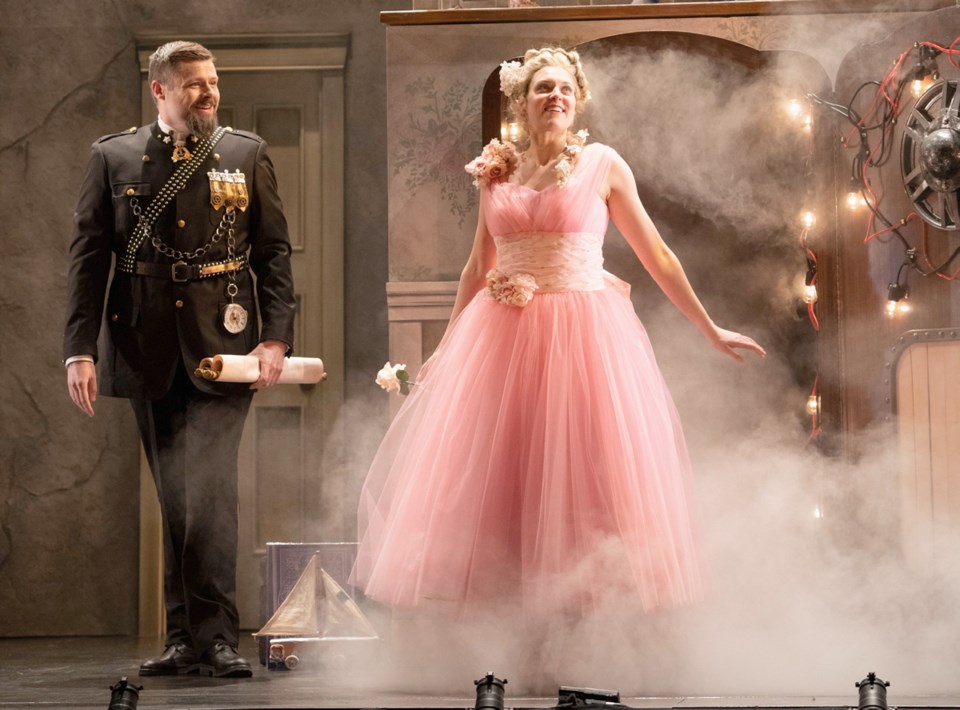Although the baroque music is unquestionably beautiful, there’s a problem with the plot of Handel’s opera Rinaldo.
Simply put, the storyline is wacko.
It’s even wacko by the usual standards of opera, a bizarro world in which wrong babies are mistakenly tossed onto fires and heroines fling themselves off parapets at the slightest provocation. In Rinaldo’s mish-mash of a plot, dragons cavort, sorceresses unleash crazed minions, Christian magicians pop up to do good works and people fall in and out of love within nano-seconds (OK, the latter is actually fairly common).
Thank goodness, then, for stage director Glynis Leyshon, who, for Pacific Opera Victoria’s invigorating revival, has hatched a clever and charming solution to Rinaldo’s kookiness. Repositioning the 18th-century opera in wartime Britain, she resets the shenanigans as a children’s fantasy. After daddy dons his Second World War helmet and goes off to battle, his young son and daughter — clad in pajamas and nightgown — imagine the entire thing, witnessing it all from the sidelines à la Clara in The Nutcracker.
With such a conceit, any zaniness becomes charming and even amusing. And for the modern audience, the approach also serves to make the notion of a romantic male hero with a disconcertingly high-pitched voice more palatable. (In fact, Rinaldo features two good-guy counter-tenors: Rinaldo the bold knight and Goffredo the brave general. The roles are nicely sung by the POV’s Andrey Nemzer and David Trudgen. However, there’s something unintentionally risible about two men stoically trudging through mountains while exchanging falsetto bon mots.)
This is a superb production, beautifully staged, cleverly directed and well-performed. In this opera, there is a lot of lyrical repetition, yet thanks to Leyshon and company, we are unceasingly entertained.
The Victoria Symphony benefits from conductor Timothy Vernon’s obvious love for the material. On Thursday, the tempos were pleasingly brisk and the playing accomplished and vivacious. Harpsichordist Tatiana Vassilieva was a special delight throughout — her extended solo as poor Rinaldo is buffeted by the furies was a virtuoso workout earning its own applause. Handel’s brilliant orchestration is fresh and witty, with the harpsichord and brass echoing the singers’ florid passages enchantingly.
The standout star is Nemzer, the Russian counter-tenor playing Rinaldo. One of this opera’s celebrated arias is Cara sposa, in which Rinaldo laments the disappearance of his love, Almirena. Nemzer, clad in a leather jerkin, sang this heartbreaking song with superb technical control and phrasing. Performing throughout with admirable projection, he revealed a naturally beautiful voice: pure, clear, polished.
As Almirena, soprano Stéphanie Lessard wears a puffy pink Disney princess gown in keeping with the fantasy theme (all the fine costumes are by Pam Johnson, who also designed the excellent set).
Lessard was captivating when she sang Rinaldo’s best-known aria, Lascia ch’io pianga (Let me weep), winning over the audience with her buttery delivery and big, rounded tones, the orchestra mirroring each of her sigh-like phrases.
Also notable was soprano Jennifer Taverner as Armida, an evil sorceress who enters to thunder claps and lightning flashes. Taverner sang well, successfully navigating difficult coloratura passages and projecting the powerful stage presence such a pivotal role demands. The effect was boosted by a trio of capering furies (resembling satanic members of ABBA in their fright wigs and wildly flared trousers) and such devices as a giant cage in the shape of a spider, in which Almirena is imprisoned.
The visual tricks in Rinaldo are unrelenting, giving the production a circus-like appeal. Rinaldo ascends skyward in a full-sized boat; a Chinese-style dragon lashes its tail; English rowhouses belching smoke suggest a children’s storybook come to life. One of the design team’s triumphs is a giant moon projection with many incarnations — often featuring a creeping spider representing the sorceress’s diabolical inclinations.
Leyshon’s gift for intelligent humour works wonderfully. Argante, well-sung and acted by baritone Christopher Dunham, arrived in a chariot with two prancing gladiators for horses. One of the horse-men twitched his head in an amusingly equine manner. Elsewhere, a row of roses dropped dramatically from the ceiling like lawn darts and with a thunk impaled a table, causing the woman beside me to exclaim “That’s amazing — what a hoot!” Such sharp attention to detail is the mark of a superior production.
This is one of the best creations I’ve seen from Pacific Opera Victoria. Don’t miss it.
Performances continue today, April 27 and April 29.

-thumb.png;w=120;h=80;mode=crop)

